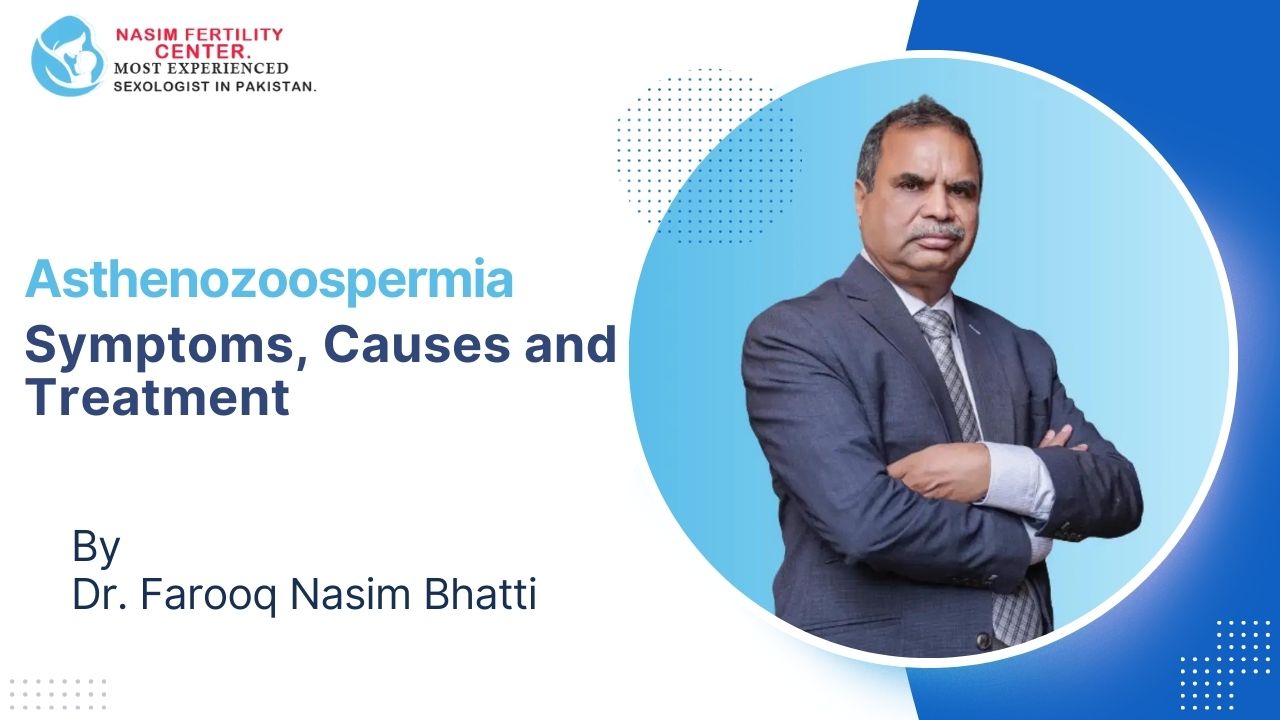
Male infertility is a growing concern worldwide, and one of the most common contributing factors is asthenozoospermia. This condition refers to reduced sperm motility, meaning the sperm’s ability to swim effectively is impaired. Since healthy sperm movement is critical for natural conception, asthenozoospermia can significantly affect a man’s chances of fathering a child. The good news is that with the right diagnosis and treatment, many men can successfully overcome this condition.
In this article, we’ll explore the symptoms, causes, diagnosis, and treatment options for asthenozoospermia, along with expert care available at Nasim Fertility Center.
What is Asthenozoospermia?
Asthenozoospermia is a medical term used when a man’s sperm show low motility (poor movement) in a semen analysis. For fertilization to occur, sperm must swim through the female reproductive tract to reach and penetrate the egg. When sperm move slowly or irregularly, the chances of successful fertilization decrease.
There are two types of motility issues seen in asthenozoospermia:
Progressive motility – Sperm move in a straight line or large circles (healthy motility).
Non-progressive motility – Sperm move but not effectively toward the egg.
If a significant percentage of sperm are non-progressive or immotile, the diagnosis of asthenozoospermia is made.
Symptoms of Asthenozoospermia
Asthenozoospermia itself does not usually cause visible symptoms in men. Most men only discover it when they face difficulties conceiving and undergo fertility testing. However, some indirect signs and situations may raise suspicion:
Difficulty achieving pregnancy despite regular unprotected intercourse for over a year.
History of recurrent miscarriages in the partner (sometimes linked to poor sperm quality).
Associated symptoms of underlying conditions (e.g., hormonal imbalance, testicular pain, varicocele).
Because the condition is often silent, the only reliable way to confirm it is through a semen analysis performed in a fertility clinic.
Causes of Asthenozoospermia
Asthenozoospermia can result from various factors affecting sperm health and movement:
1. Lifestyle and Environmental Factors
Smoking, alcohol, or drug use
Poor diet and obesity
Heat exposure (frequent use of hot baths, saunas, or laptops on the lap)
Exposure to toxins, chemicals, or radiation
2. Medical Conditions
Varicocele (enlarged veins in the scrotum affecting testicular function)
Hormonal imbalances (low testosterone, thyroid disorders)
Genital tract infections
Genetic or structural sperm defects
3. Other Factors
Age-related decline in sperm quality
Oxidative stress and free radical damage
Certain medications or cancer treatments (chemotherapy, radiation therapy)
Diagnosis of Asthenozoospermia
The gold standard test is a semen analysis. A fertility specialist examines:
Sperm count
Sperm motility (progressive, non-progressive, immotile)
Sperm morphology (shape and structure)
In some cases, additional tests such as hormone evaluations, genetic testing, scrotal ultrasound, or sperm DNA fragmentation tests may be recommended to identify the underlying cause.
Treatment Options for Asthenozoospermia
Treatment depends on the severity of motility problems and their root cause. Options include:
1. Lifestyle Modifications
Quitting smoking and alcohol
Maintaining a healthy weight
Eating an antioxidant-rich diet (fruits, vegetables, omega-3 fatty acids)
Reducing stress and improving sleep
2. Medical and Surgical Treatments
Antibiotics for infections
Hormone therapy for hormonal imbalances
Surgery for varicocele repair
3. Assisted Reproductive Techniques (ART)
If natural conception is difficult, advanced fertility treatments can help:
Intrauterine Insemination (IUI): Washed sperm with better motility are directly placed in the uterus.
In Vitro Fertilization (IVF): Eggs are fertilized in the lab with sperm.
Intracytoplasmic Sperm Injection (ICSI): A single healthy sperm is injected directly into the egg, often used for severe motility issues.
Asthenozoospermia Care at Nasim Fertility Center
At Nasim Fertility Center, led by Dr. Farooq Nasim Bhatti, patients receive world-class care for male infertility, including asthenozoospermia. With over 30 years of experience and as Pakistan’s first American Board-certified medical sexologist, Dr. Bhatti has helped thousands of couples achieve parenthood.
The center offers:
Comprehensive semen analysis and advanced diagnostic tests
Evidence-based treatments tailored to each patient’s needs
Access to cutting-edge ART techniques like IVF and ICSI
Confidential online consultations for patients across Pakistan, including those in smaller cities who cannot travel frequently
Whether your motility issues are mild or severe, the personalized, research-driven approach at Nasim Fertility Center ensures you get the best chance at improving fertility outcomes.
Conclusion
Asthenozoospermia may seem like a daunting diagnosis, but with modern medical advancements, most men can overcome this challenge and build their families. The key lies in early diagnosis, expert evaluation, and appropriate treatment.
If you or your partner is struggling with infertility and suspects sperm motility issues, don’t delay. Reach out to an expert fertility specialist like Dr. Farooq Nasim Bhatti at Nasim Fertility Center to explore your options and take the first step toward parenthood.
Disclaimer
This information is for educational purposes and not the treatment. For treatment, you need to consult the doctor.

Dr. Farooq Nasim Bhatti (MBBS, FAACS – USA, Diplomate: American Board of Sexology, CST, HSC – Hong Kong, CART – Malaysia & China) is a qualified medical sexologist with 30+ years of experience. He has presented 21+ research papers internationally and treats sexual dysfunction through sex therapy, counseling, and pharmacotherapy to restore natural sexual function without temporary medication.

Regain Confidence with Our ED Solutions
Explore effective treatments for erectile dysfunction. Take charge of your intimacy today.


